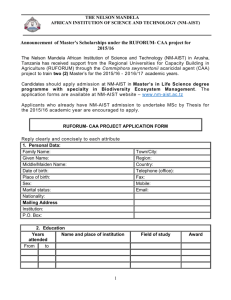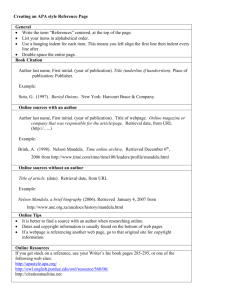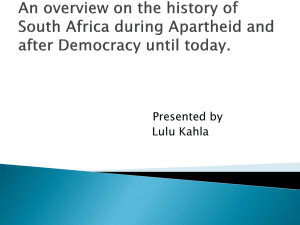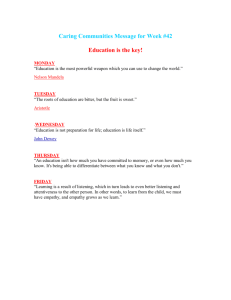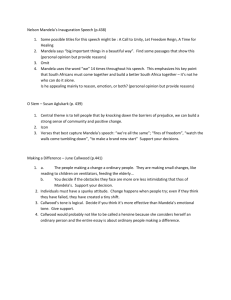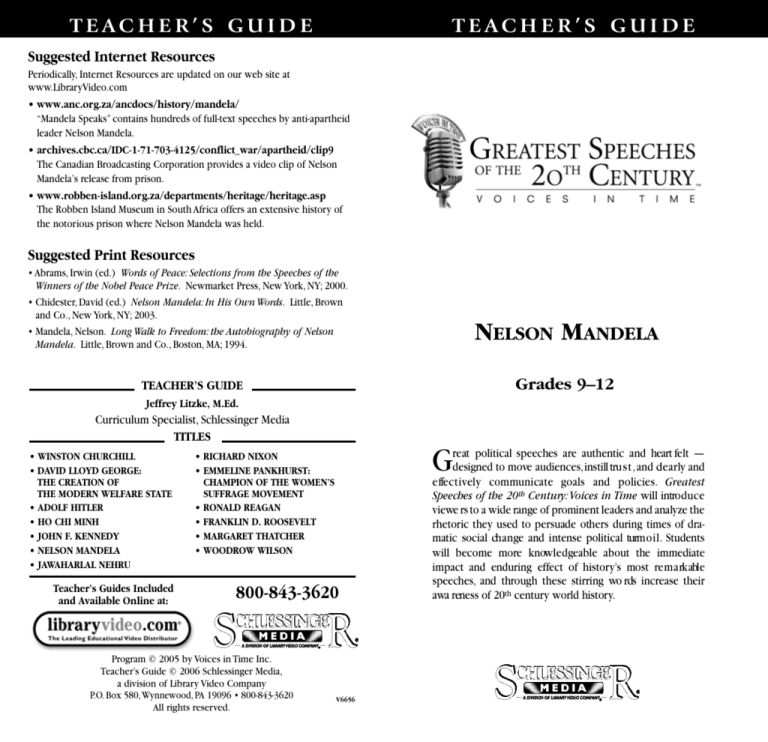
TEACHER’S GUI DE
TEACHER’S GUI DE
Suggested Internet Resources
Periodically, Internet Resources are updated on our web site at
www.LibraryVideo.com
• www.anc.org.za/ancdocs/history/mandela/
“Mandela Speaks” contains hundreds of full-text speeches by anti-apartheid
leader Nelson Mandela.
• archives.cbc.ca/IDC-1-71-703-4125/conflict_war/apartheid/clip9
The Canadian Broadcasting Corporation provides a video clip of Nelson
Mandela’s release from prison.
• www.robben-island.org.za/departments/heritage/heritage.asp
The Robben Island Museum in South Africa offers an extensive history of
the notorious prison where Nelson Mandela was held.
Suggested Print Resources
• Abrams, Irwin (ed.) Words of Peace: Selections from the Speeches of the
Winners of the Nobel Peace Prize. Newmarket Press, New York, NY; 2000.
• Chidester, David (ed.) Nelson Mandela: In His Own Words. Little, Brown
and Co., New York, NY; 2003.
• Mandela, Nelson. Long Walk to Freedom: the Autobiography of Nelson
Mandela. Little, Brown and Co., Boston, MA; 1994.
NELSON MANDELA
Grades 9–12
TEACHER’S GUIDE
Jeffrey Litzke, M.Ed.
Curriculum Specialist, Schlessinger Media
TITLES
• WINSTON CHURCHILL
• DAVID LLOYD GEORGE:
THE CREATION OF
THE MODERN WELFARE STATE
• ADOLF HITLER
• HO CHI MINH
• JOHN F. KENNEDY
• NELSON MANDELA
• JAWAHARLAL NEHRU
Teacher’s Guides Included
and Available Online at:
800-843-3620
Program © 2005 by Voices in Time Inc.
Teacher’s Guide © 2006 Schlessinger Media,
a division of Library Video Company
P.O. Box 580, Wynnewood, PA 19096 • 800-843-3620
All rights reserved.
reat political speeches are authentic and heart felt —
designed to move audiences,instill tru s t ,and clearly and
e ffe c t i vely communicate goals and policies. Greatest
Speeches of the 20th Century:Voices in Time will intro d u c e
viewe rs to a wide range of prominent leaders and analyze the
rhetoric they used to persuade others during times of dramatic social change and intense political turm o i l . Students
will become more knowledgeable about the immediate
impact and enduring effect of history’s most re m a rk able
speeches, and through these stirring wo rds increase their
awa reness of 20th century world history.
G
• RICHARD NIXON
• EMMELINE PANKHURST:
CHAMPION OF THE WOMEN’S
SUFFRAGE MOVEMENT
• RONALD REAGAN
• FRANKLIN D. ROOSEVELT
• MARGARET THATCHER
• WOODROW WILSON
V6656
Historical Overview
Apartheid’s institutionalized suppression of millions was well documented for
its viciousness and was designed to prevent the black majority from attaining
economic or political independence. After having been hidden behind a curtain of segregation for a quarter century, Nelson Mandela emerged from captivity in 1990 and addressed the hopes and fears of South Africans.The largest
audience he ever had listened to his visionary speech that called for aggressive
mass action to achieve the goal of a democratic and free society. By 1994, he
would speak to a worldwide audience as the first black head of state in South
African history.
Time Line
1652 — The first Dutch settlers arrive in South Africa.
1795 — The British establish a presence in the Cape Colony.
1886 — Gold and diamonds are discovered in South Africa.
1902 — The British are victorious in the Boer Wars.
1912 — The African National Congress (ANC) is founded.
1918 — Nelson Mandela is born in a small village in South Africa.
1948 — The Afrikaner National Party wins control in an all-white election.
1952 — The ANC launches the Defiance Campaign.
1964 — Nelson Mandela is sentenced to life imprisonment.
1990 — The ANC is legalized and Nelson Mandela is released from prison.
1994 — Nelson Mandela is elected president of South Africa.
Umkonto We Sizwe (MK) — A separate military wing of the ANC, whose
name means “Spear of the Nation,” which was organized by Nelson Mandela
in 1961 after the failure of nonviolent protest.
The Rivonia Trial — The trial that took place in South Africa between 1963
and 1964, which resulted in the conviction and life imprisonment of Nelson
Mandela and other ANC leaders.
Robben Island — Site of the infamous prison off the coast from South
Africa where Nelson Mandela and other political prisoners were held.
Nobel Peace Prize — An international award presented annually to the
person who does the most to preserve world peace.
Presidential Medal of Freedom — A medal given by the president of the
United States to recognize distinguished civilian service.
Discussion Questions
1.What is the African National Congress?
2. How were many countries dealing with South Africa by the 1980s? What
were the exceptions to this policy?
3.What was the effect of the Natives Land Acts?
4.As a youth, how was Nelson Mandela taught to view white society?
5.What happened in Sharpeville on March 21, 1960?
6. How did the South African government respond to the “Free Mandela” campaign in the 1980s?
7.What initiatives did Nelson Mandela undertake after his retirement?
Vocabulary
Discussion Questions and Activities
apartheid — The policy of white South African governments to enforce
strict racial segregation and discrimination.
African National Congress (ANC) — A South African political group
formed in 1912 that led the anti-apartheid struggle and subsequently ruled
the country.
colonialism — The policy of a dominant country conquering and ruling a
weaker country, usually for the purpose of exploiting the weaker country’s
natural resources.
sanctions — International restrictions in the buying and selling of goods
with a country considered to have broken international law.
Natives Land Act — A 1913 apartheid law dispossessing and limiting land
ownership rights of black South Africans.
pass laws — The laws of the apartheid South African government that forced
all people to carry passports that identified their race.These were used to
restrict where black Africans could live and work.
Tembu — A Bantu-speaking people of South Africa. Nelson Mandela was the
son of a Tembu chief.
Afrikaaner — Northwestern European settlers who arrived in South Africa
beginning in 1652 and lived under the administration of the Dutch East India
Company.
• After he walked out of prison after 27 years of captivity, Nelson Mandela
delivered one of the most anxiously awaited speeches in modern history.
Ask students to analyze the text of Mandela’s 1990 speech and describe its
tone, use of language and message. Students may discuss Mandela’s views
on the anti-apartheid struggle and evaluate the words he repeated from his
1964 Rivonia Trial speech. Mandela’s speech on his release from prison in
1990 may be found at the following web site:
www.fordham.edu/halsall/mod/1990MANDELA.html
• Nelson Mandela was the son of an African chief and grew up hearing
stories about African pride and anti-colonial resistance. In a 1990 speech to
quell political violence between ANC supporters and the Inkatha Freedom
Party, Mandela promoted African unity.Ask students to read the text of
Mandela’s 1990 Durban speech and to create detailed time lines that
include activists, leaders and battles from South African history.The full text
of Mandela’s Durban address may be found at the following web site:
www.anc.org.za/ancdocs/history/mandela/1990/sp900225-1.html
• After his election as president in 1994, Nelson Mandela faced the challenge
of governing a nation transitioning from an apartheid state to a modern
constitutional democracy.Ask students to research and list Mandela’s
achievements and disappointments as the first black leader of South Africa.
What social and economic challenges was he able to overcome? What were
his most intractable problems?
(Continued)




